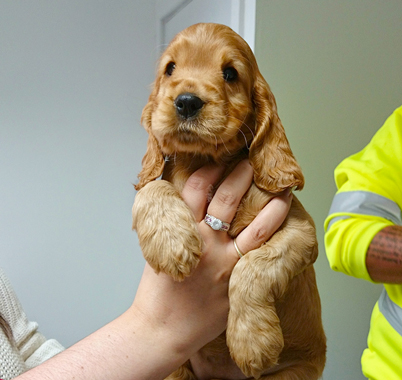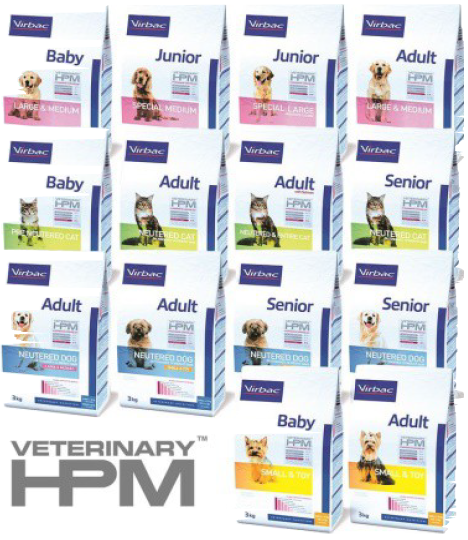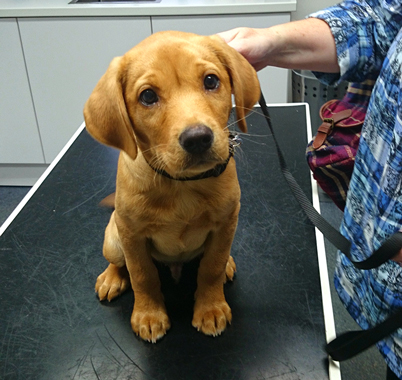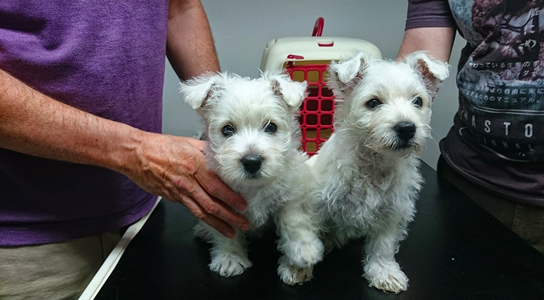At Westport Veterinary Clinic we recommend that a puppy health check be carried out within a few days of collecting your puppy, which is why we offer a free consultation for a puppy health check. At this time you can ask any questions that you may have.
Here is some advice to get you started, there is lots more information in this handout. For the handout version CLICK HERE.
We know only too well just how much new information there is to take in when expanding your family to include a canine companion, so we wrote this handy guide to help you with some of the things you may be wondering about as you settle your puppy into their new home and help them to grow into a happy, healthy, confident young dog.
Vaccinations
Most puppies are born with some immunity, which they get from their mum. This only lasts for up to two months so your puppy needs to be vaccinated to continue the protection.
Regular vaccinations are important to protect against infection with distemper, hepatitis, parvovirus, parainfluenza and leptospirosis. First vaccinations can be given from 7 weeks of age, followed by a second vaccination 2-4 weeks later, when at least 10 weeks old. Your puppy can start going out for short walks 1-2 weeks after the second vaccination.
After this primary vaccination course it is important to keep your pet up to date with yearly booster vaccinations to ensure continued protection; this is also a requirement for boarding at most kennels.
We also advise giving the kennel cough vaccination (included in our Friends of Westport scheme) which will help protect against some respiratory infections. Despite the misleading name, these infections can be picked up anywhere, not just from kennels! We can give this after the primary vaccination course.

Parasite medications – fleas, ticks, roundworms, tapeworm and lungworm
We advocate using appropriate parasite prevention throughout your pet’s life, both for their health and the health of their human family!
We advise using the following two tablets, each given monthly, to provide your puppy with comprehensive anti-parasitic cover. Credelio prevents flea and tick infestations, whilst Milbemax is active against roundworms, lungworms and tapeworms. Both of these products are available monthly on our healthcare plan, Friends of Westport.
Lungworm can cause serious health problems and prevention is always better than cure, especially as we now know it is spreading and has been reported in central Scotland. Ticks are no longer a problem only of rural areas, and can transmit potentially life-threatening diseases. Heavy roundworm burdens can cause serious disease in young animals, including intussusceptions; they also pose a human health risk.
For all of these reasons and more, it is important to follow veterinary recommendations for parasite prevention. Veterinary anti-parasitic products have been clinically proven to be safer and more effective than ‘over the counter’ versions bought at pet shops and supermarkets.
Micro-chipping
It is a legal requirement for puppies to be micro-chipped at 8 weeks of age. A microchip is a tiny chip, the size of a grain of rice, which is implanted under the skin between the shoulder blades. It contains a number unique to your pet, which is then registered with a microchip database, along with your name, address and contact details. This means, if your pet was ever to get lost, they could be scanned when found and the database searched for your details, so they could be safely reunited with you.
For this reason, it is very important to keep your registered details up to date. If your puppy has been microchipped with us, we will initially register the chip; if your pup was chipped with the breeder, you’ll want to check your details have been added to the system. If any of your contact details change in the future, it’s important to update the information you have registered. Please ask if you have any questions or concerns about this.
Feeding
Getting the right nutritional balance is very important at all stages in your pet’s life, to ensure healthy development and growth. The best way to achieve this is by feeding a high quality, protein based, balanced diet especially formulated for puppies e.g. Virbac Veterinary HPM.
Veterinary HPM™ is an advanced low-carb, high-protein formulation specifically designed to support the long-term health and well-being of cats and dogs, the highly evolved carnivores in our own homes. Young puppies should be fed around 4 small meals a day when they are 8 weeks old. Feeding frequency can be reduced gradually as meal sizes increase.
We offer buy one get one free on your first bag of puppy food as well as getting your 6th bag free as part of our loyalty scheme!

Friends of Westport
Prevention is better than cure, so we want to make preventative health care easy and affordable. Our Friends of Westport healthcare scheme covers the preventative treatments your pet needs throughout life, such as vaccinations, flea, tick and worming treatments and regular health checks.
Using our scheme can save up to 70% on just the essential preventative health care. Extra benefits include a 10% discount off nearly everything (most products and procedures undertaken exclusively at our practice).
Insurance
We strongly advise getting your new puppy insured as soon as possible, to give you peace of mind that your pet is covered should they need it. A lifetime policy is the most comprehensive cover available (covers your pet year after year even for long-term conditions, so long as you don’t change policies) and we would always recommend opting for the highest payout you can afford. Pet insurance is one area of life where it is certainly worth checking the fine print; for example, does a particular policy cover any dental work your pet may require during their lifetime?
We work in partnership with Petplan to offer 4 weeks of free insurance as Immediate Veterinary Cover; we can start the process of setting this up as soon as your puppy has been checked over by one of our vets. This will be activated by yourself via the email you will receive from Petplan.
Please use these 4 weeks to look around at the different insurance companies and policies to find out which is best for you. If you have any questions please ask one of our team.

Habituating your puppy to teeth brushing, nail clipping and other handling
The accompanying handout, entitled ‘Protocol for Activities to Practice with your Puppy or Kitten’ is a really useful tool for getting your pet used to much of the handling they may need for routine healthcare, for example having eyes and ears checked, nails clipped or a ‘pill’ given.
Teaching your young pet that these procedures are not scary, and that they can even be fun or signal that a reward is coming, is a really useful life skill to give them.
With any of these activities, the key is to break it down into small stages, go at your puppy’s own pace, never force anything and ensure that they are rewarded for calm behaviour.
Dental Care
Periodontal disease is a serious but sometimes overlooked health issue; indeed, more than 87% of dogs over 3 years of age have some form of this progressive, degenerative disease. Dogs are very good at hiding dental pain from us, but believe us, it is sore!
The best time to start dental care for your puppy is now! Getting them in a routine is much better and easier than having to start after they already have sore mouths. We also advise using Healthymouth water additive, which has been shown to reduce plaque build up in dogs by an average of 74.3% (you can more dental information here). At the regular weight checks up until 6-8 months old, our vets and nurses will show you how to introduce teeth brushing and other dental care products.

Flea and Worming treatments
We advise using wormer and flea treatments once monthly until 6 months old. Due to the rapid development and growth all puppies experience at this age, we need regular weight and health checks with the nurse to ensure correct dosing.
This ensures correct dosing relative to bodyweight for parasite prevention and allows us to check that your pet is a healthy weight. These appointments also provide fantastic opportunities to develop your puppy’s positive associations with spending time in the practice!
It is important to chose the treatment from your vet who will be able to recommend the most appropriate medications for you situation. Also these treatments have been clinically proven to be safer and more effective than ‘over the counter’ versions bought at pet shops and supermarkets.
Many puppy’s get roundworms from their mothers. They cross the placenta before birth and then from their mother’s milk. Heavy worm burdens can cause serious disease in young animals, including intussusceptions and also pose a human health risk for example visceral larval migrans/ toxocariasis. Dogs can continue to become re-infected throughout life from the environment and from re-activation of dormant larvae within their own bodies, and so ongoing regular worming is a life-long requirement.
Neutering
When your puppy is old enough, you may want to think about getting them neutered (spayed (females) or castrated (males)).
We neuter dogs from 6 months of age, depending on their size. For large breeds, we advise you to consider waiting until they are fully grown before neutering, as there is some evidence that early neutering in these breeds may increase the risk of orthopaedic problems in later life.
There are many benefits to neutering, such as preventing unwanted litters and reducing the risk of certain cancers and other problems, but as each dog is an individual with different requirements, we will be happy to talk through what may be best for you and your pet in terms of why, when and whether to consider neutering.

If you have any questions please call us at your local branch, contact details are at the bottom of the page.
Training
Below are some handy hints on training your new puppy in some of the key skills that will help them in puppyhood and throughout their life.
- Sleeping arrangements:
- Whether or not you use a crate or just a bed in a well puppy-proofed room, where your puppy sleeps should feel like a really safe, secure zone for them. Rewarding your puppy for going there, and then staying there, is a good way to build up this positive association. They should have free access to it during the day and should never be put there as a punishment. A crate can be a good option as it can safely contain your puppy when you aren’t there.
- Going to their new home as a puppy is one of the most significant events in most dogs’ lives. There are new faces, new sights, new smells, and mum and siblings are no longer around to provide familiarity. Whilst letting your puppy sleep in your bed sets you up for a lifetime of having to do this and thus is not advised, having them in a crate beside your bed for the first couple of nights isn’t a bad idea; they will be comforted by your presence and you will wake quickly if they need to go out to the toilet. If the breeder has given you a blanket or similar from their house, put this in the crate/bed to provide a familiar smell.
- Over the next few nights, you can then move the crate away from the bed, say into the hall and then gradually to where you want your pup to spend nights long-term (eg. the kitchen or living room).
-
Toilet training:
- If you have a secure private garden, it’s generally easiest to train your puppy to toilet outside from the start. Take them out after waking up, eating, drinking or playing, as they will often need to go after these activities. If they are playing and suddenly stop, they may have realised they need the loo, so this is another good time to take them out.
- If this isn’t an option and you are training them to puppy pads instead, place these near the door. Again, take your puppy here right after waking up, eating, drinking or playing. When your puppy has had all their vaccines and is able to start going outside in public places, you can quickly take them outside when they go to the pads, as well as starting to take them outside at the expected times as above.
- When your puppy toilets where you want them to, praise them effusively.
- When they do have accidents (and they will get caught short when young) DO NOT tell them off; simply clean it up quietly.
- After your puppy has toileted outside, let them have a few minutes playtime/sniffing outside; if you swoop them straight back in, they can connect toileting with having to go inside and so may hold it.
-
Time alone:
- Being comfortable on their own is a really important life skill for all dogs. Like with most other things, the best time to learn that this is ok is when your puppy is young and everything is a learning experience.
- Start with just a few minutes in the crate several times a day with a snugly blanket and a chew. At first, you can stay in the same room and just not to talk or interact with your puppy during this time, but you should slowly build up to having them be comfortable with you being out of the room/house and for longer periods.
- That being said, puppies will usually need the toilet about once an hour initially so shouldn’t be left longer than this and even much older dogs shouldn’t be left for more than about 4 hours as a general rule.
- Collar and lead/harness and lead:
-
-
- Practice putting these on for short, then gradually increasing, periods of time in the house to get your puppy used to the feel of them.
- If they shy away from these things, try just placing them on the floor initially and rewarding you puppy for sniffing them, then pick them up and reward your pup for putting their nose through the collar and so on.
-
- Sit, stay, recall:
- These are three of the most useful signals you can teach your dog, and they can be learned from a young age. See the additional handout entitled ‘Protocol for Teaching Cats and Dogs to “Sit”, “Stay” and “Come”’.

Appropriate toys, and how to play with puppies
Of course, for puppies, one of their most-loved activities is playtime! Through play, young animals learn how to interact with the world around them and the people and animals in it. They learn what behaviour is appropriate when interacting with humans and with other dogs and develop problem-solving abilities as they learn to manipulate objects such as food puzzles and chew toys. Here is a quick guide to keeping play safe and fun:
- Appropriate toys:
- Puppies are teething for much of the first 6 months of their lives, and so they need safe chew toys. These should be too big to swallow, and firm enough to help with massaging the gums without being solid enough to damage the teeth.
- Companies such as Kong produce high quality, durable rubber toys that are categorised by size and age of dog, with softer rubber for teething puppies. They can also be stuffed with food to provide great environmental enrichment. Check out the range here: https://www.kongcompany.com/en-uk/learn/chewing-style
- These toys should be checked regularly to ensure no pieces of the rubber are starting to come off.
- Other food puzzles, such as treat-balls or snuffle mats, can be really good for getting your puppy’s brain working at mealtimes, encouraging brain development and teaching them they can have fun on their own.
- Soft toys can be a great option, but should be checked regularly for tears/stuffing coming out/etc to minimise swallowing risk.
- If you have any doubt about whether your puppy could take apart a toy (and thus potentially swallow pieces), do not leave them unsupervised with it.
- How to play with puppies:
- Playing gently goes without saying. You want to ensure your puppy is enjoying every bit of handling they receive and is building up really positive associations with interacting with people. Having as wide a variety of people, of different ages, genders and races, play gently with your puppy will really help their socialisation process (more on this in the next section).
- However, the temptation for many people as large-breed puppies get older is to wrestle with them: it’s really important not to do this. They can learn to expect this with all humans, and some will be too frail or small to cope with this or may find it frightening. It can also be difficult to encourage your pet to do what you ask if a minute ago you were wrestling on the floor with them. This is one of those habits it’s best not to start!
- There are many fun games involving toys you can teach your puppy to play as they grow; these can be highly rewarding and teach your pet to have a great time whilst not being too physical with humans. Wrestling games are best played between dogs of similar size and strength who both enjoy it and read each other well.
- Puppies tend to explore their physical world with their mouths, as they don’t have opposable thumbs! If your possessions are victims of this, it’s best to gently disengage your pup from what they are chewing and offer them an appropriate chew toy instead. If your hands are the target, the first thing to do is to stop interacting with your puppy and put your hands behind your back. Try not to make eye contact or speak to them. This way, they learn that when mouthing/biting starts, the fun stops. You can them give them a chew toy to use instead, teaching them that toys are a more appropriate and fun outlet for this behaviour.
-
Socialisation and Habituation
Socialisation – this is how puppies learn to relate to and interact with people, dogs and other animals.
You can aid this by ensuring your puppy has positive interactions with as many people as possible: people of different ages, races and genders; people with funny hats, high vis vests, umbrellas, prams and walking sticks; men with beards; people talking loudly and laughing; and so on.
Meeting a wide variety of dogs who are good with puppies is important too, so your pup can learn how to behave with them, as well as how to read their behaviour. Puppy classes can be a brilliant way to assist socialisation of your pup, but if you choose to enrol your pet in these, they should ‘as well as’ not ‘instead of’ other social interactions. Your puppy will be able to meet lots of other dogs once their vaccination course is completed. However, to take full advantage of the socialisation period in the meantime, if you have friends with dogs who are up to date with their vaccines and flea and worming treatment and are healthy, letting your puppy meet them in your home or garden/your friend’s home or garden confers minimal disease risk and can be a great way to start this process early.
If you have other pets (eg. cats or horses), your puppy will need to learn to accept them and vice versa. Please ask if you would like any advice on how to do this.
Habituation – this is the process by which an animal learns which things in their world are normal and thus not to be worried about. This is about environments, objects and noises rather than social interaction. You will want to ensure your puppy is comfortable with noises around the house, such as hoovers, hairdryers, etc; with outside noises such as traffic, car horns, etc; with the environments (indoor and outdoor) they may be in (eg. rural, urban, homes, cafes, pubs, vets, groomers, etc); with odd visual things such as flapping plastic bags, traffic cones, etc.; with car travel; and with anything else they may come across.
Sensitisation – this is what happens if a young animal is exposed to too much, too fast. For example, if the first time your puppy sees and hears traffic is at the side of a busy main road, instead of learning that they don’t need to worry about cars, they will likely learn that cars are scary loud things and startle every time they go past. On the other hand, if you start getting your puppy used to traffic on a quiet side street, monitor their responses and see that they aren’t worried, you can gradually take them to busier and busier places.
You can usually progress faster with bolder puppies, whereas shy puppies will take longer to get used to each new thing. Start with a small version of the stimulus and build up. The key is to keep checking in with your puppy; alert is fine, frightened isn’t. Aim for socialisation and habituation, NOT sensitisation.
The charity Dogs Trust has set up a wonderful resource, called The Puppy Plan, to help with this process:
http://www.thepuppyplan.com/the-science/summary#.Xo3t0chKg2w
The Puppy Plan talks you through how to socialise and habituate your puppy, step by step. Click on your puppy’s age to see the tasks for that section and set up your puppy’s own personal checklist to track their process.
Dogs Trust also have a series of recordings to help habituate your puppy to different noises. These are free to download and come with a comprehensive instruction manual:
https://www.dogstrust.org.uk/help-advice/dog-behaviour-health/sound-therapy-for-pets

If you have any questions please call us at your local branch, contact details are at the bottom of the page.

